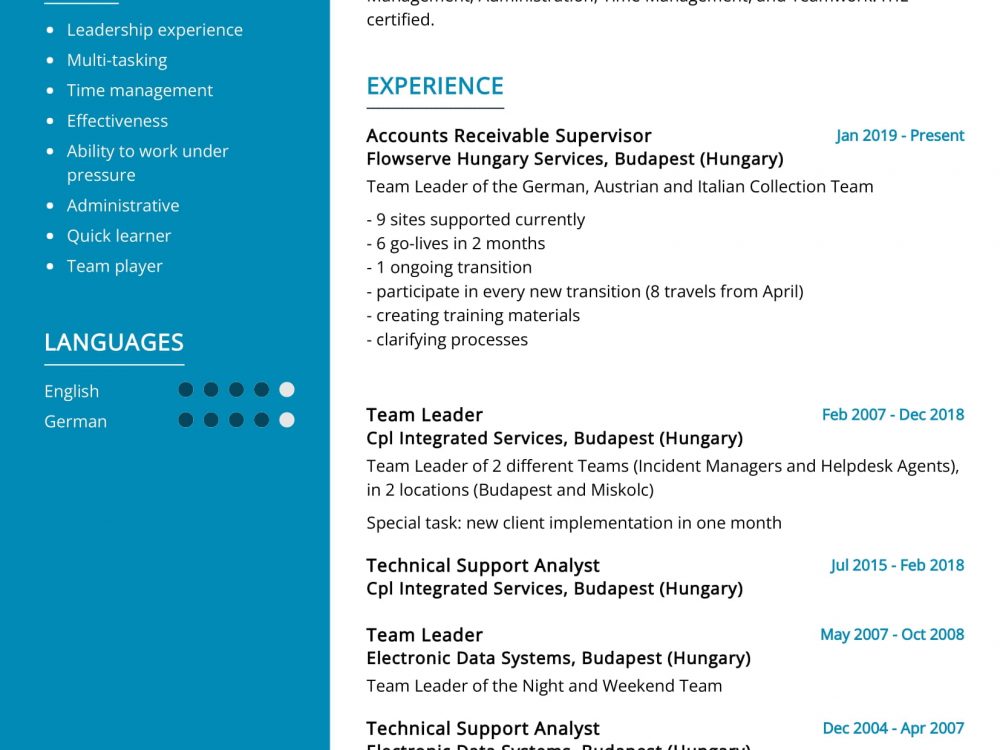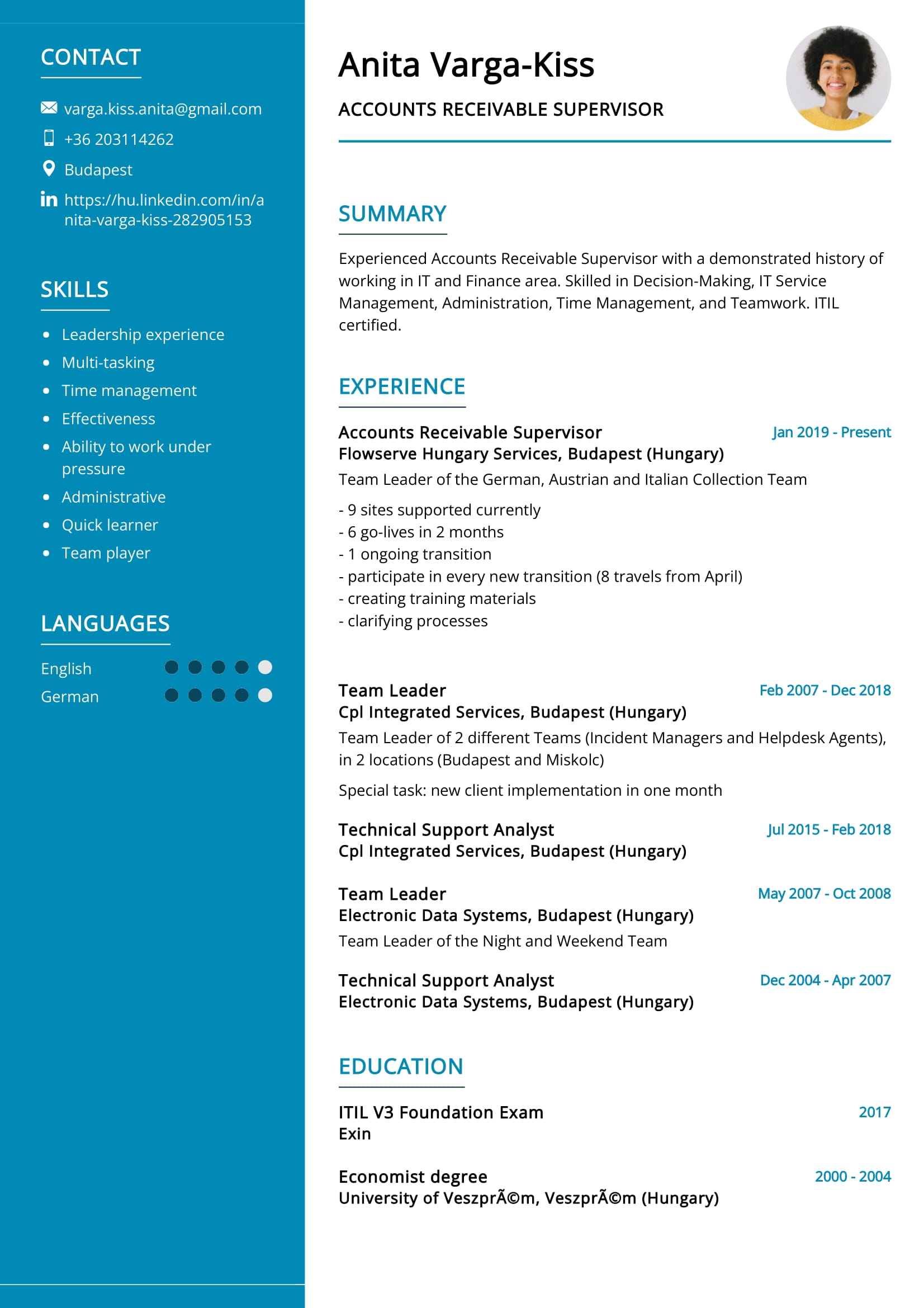What should be included in a Accounts Receivable Resume?
When creating an Accounts Receivable resume, there are several important elements that should be included. First, it is important to include a summary statement that explains your qualifications and career goals. This statement should be tailored to the specific position you are applying for, and should provide a brief overview of your relevant experience and education.
Your resume should also include a list of your key skills and competencies. These should be related to the job you are applying for, and include specific areas such as customer service, problem solving, accounting knowledge, and data entry. It is also important to list any experience or qualifications you have in dealing with accounts receivable.
Experience should be a key component of your Accounts Receivable resume. List all the positions you have held that are related to the job you are applying for, including any internships and volunteer experience. Include any awards or recognition you have received in the field, as well as any certifications or continuing education courses you have taken.
Finally, make sure to include any additional information that may be relevant to the job. This can include any software programs or systems you are familiar with, as well as languages you may speak. You should also include references and contact information, as well as any additional interests or hobbies that might be related to the position.
By ensuring that these elements are included in your Accounts Receivable resume, you can make sure that your resume stands out from the rest.
How do you list Accounts Receivable skills on a resume?
When it comes to listing your Accounts Receivable skills on your resume, there are a few key points to remember. First, be sure to highlight any experience or qualifications you have in the field of Accounts Receivable. This could include any customer service experience you may have had and any specialized knowledge or skills you possess. Additionally, you should highlight any software applications or programs you are familiar with that are related to Accounts Receivable processes, such as QuickBooks.
You should also include any certifications or other industry-related courses you have taken or completed. These can be a great way to demonstrate your commitment to a career in Accounts Receivable and give employers an idea of how qualified you are for a position.
When it comes to formatting your resume, you should be sure to include an accurate job description for any Accounts Receivable roles you have held in the past. This will help employers understand the scope of your responsibilities and how you performed in the role. Additionally, you should include any awards or recognitions you have earned while working in Accounts Receivable, such as a “Top Achiever” award or performance bonuses. These can be great ways to demonstrate your dedication to the profession and your ability to excel in the role.
Finally, when listing your Accounts Receivable skills, be sure to include any additional training you might have completed. This can include attending seminars or workshops that related to the field or completing online courses or webinars. This will demonstrate to employers that you are up-to-date on the latest trends and technologies in Accounts Receivable and are committed to staying ahead of the curve.
What is the job description of the Accounts Receivable?
The job of an Accounts Receivable is to ensure that a company’s accounts receivable records are accurate and up to date. This means that they are responsible for tracking customer payments, verifying customer invoices, preparing customer statements, and maintaining records of customer transactions. Additionally, Accounts Receivables ensure that customers pay their invoices properly and on time. This is important for a company’s financial health, as it ensures that the company does not suffer from late payments or bad debts.
An Accounts Receivable professional must be organized and detail-oriented. They must be able to juggle multiple tasks and prioritize which ones need to be completed first. Additionally, they must have strong customer service skills, as they need to be able to communicate effectively with customers. They must be able to handle customer complaints or disputes in a professional and courteous manner.
Those interested in a career in Accounts Receivable must possess the right skills and qualifications. A college degree in accounting, business, or finance is desirable but not always necessary. It is also important to have good computer skills, as they will be required to enter data into the company’s accounting system and generate reports. They must be proficient in Microsoft Office Suite, including Excel, Word, and Powerpoint. A thorough knowledge of accounting principles is also beneficial, as this will help them to accurately record transactions and keep track of customer accounts.
Those looking to start a career in Accounts Receivable should consider including this experience on their resume. This includes listing any relevant coursework, internships, and experience that demonstrate their ability to handle the job. It is also important to include any relevant certifications, such as
What is a good objective for a Accounts Receivable resume?
An objective statement on an accounts receivable resume can act as a powerful tool for demonstrating the applicant’s knowledge of their field and their enthusiasm for the job. An effective objective for an accounts receivable resume can include phrases such as, “Aiming to contribute my knowledge of accounts receivable and accounting principles to the successful operations of a leading company,” or “Seeking to use my understanding of accounts receivables to help manage and improve customer service satisfaction.” Crafting an effective objective statement on an accounts receivable resume can help to make a lasting impression and ensure the applicant stands out from the competition.
In addition to creating an effective objective statement, applicants should ensure their resume includes a clear and concise description of their skills, abilities, and experience related to accounts receivable. This includes providing details of tasks they have successfully handled, software they are proficient with, and any special projects they have undertaken. It is important to demonstrate the breadth of experience and expertise the applicant has in accounts receivable and to provide evidence of the applicant’s commitment to their work and the company.
A good accounts receivable resume should also detail any relevant certifications or qualifications that the applicant may have, such as a Certified Accounts Receivable Professional (CARP) or Certified Accounts Receivable Analyst (CRA) certification. This information can help employers to identify applicants who have the appropriate qualifications and experience to fill the vacancy.
Finally, applicants should ensure that their resume is well-structured and easy to read, and that it is tailored to the specific job they are applying for. This can help to ensure that potential employers can quickly identify the applicant’s key skills and expertise, and that the applicant’s resume stands out from the competition
Accounts Receivable Job Description
In the world of finance and accounting, few roles are as crucial as that of an Accounts Receivable Specialist. In this section, we’ll dive deep into the job description of an accounts receivable specialist, discussing the primary duties and responsibilities and the importance of this position in a business setting.
The Role Defined
An Accounts Receivable Specialist is a finance professional who ensures that a company receives payment for goods and services offered. They play a vital role in maintaining the financial health of a company by tracking and resolving outstanding payments and ensuring the company’s revenue is accurately recorded.
Key Responsibilities
The following are some of the main tasks typically associated with an Accounts Receivable Specialist’s role:
- Invoice Processing: The first and foremost responsibility of an Accounts Receivable Specialist is to generate and send out invoices to customers post the sale or service.
- Payment Tracking: They are also responsible for monitoring payments, tracking unpaid invoices, and ensuring timely payments.
- Customer Liaison: They regularly liaise with customers, answering any queries regarding invoices and rectifying any errors that may occur.
- Record Maintenance: An Accounts Receivable Specialist must maintain accurate and complete records of all billing activities.
- Dispute Resolution: If there are any discrepancies or disputes from customers about invoices, it’s their responsibility to resolve these issues promptly and efficiently.
Accounts Receivable Roles and Responsibilities Resume
Now that we’ve covered the job description, let’s explore how you can express these responsibilities effectively in a resume context. An impressive accounts receivable resume should highlight your ability to manage receivables and illustrate your skills in maintaining accurate records and enhancing customer relationships.
Summary Statement
Start with a compelling summary statement that gives a snapshot of your career, emphasizing your experience in accounts receivable roles and your ability to ensure efficient revenue operations.
For instance:
“Detail-oriented Accounts Receivable Specialist with over five years of experience in managing invoicing and payment processes, maintaining financial records, and enhancing customer relations. Proficient in using advanced accounting software and known for ensuring timely and accurate account processing.”
Work Experience
The work experience section of your resume should detail your previous roles in accounts receivable, focusing on achievements rather than just listing responsibilities.
Here’s an example of how you might structure this section:
- “Accounts Receivable Specialist | Company Name | Dates of Employment”
- Managed an accounts receivable portfolio of $500K, reducing overdue accounts by 20% within six months.
- Successfully resolved over 50 invoice disputes, maintaining excellent customer relationships and satisfaction.
- Implemented a new invoicing system that increased payment efficiency by 15%.
Skills
The skills section should highlight your competencies that make you a fit for an Accounts Receivable role. It could include technical skills like proficiency in certain accounting software, as well as soft skills like attention to detail, communication, and problem-solving.
Remember, the goal of an Accounts Receivable Specialist resume is to demonstrate your skills and experience in managing a company’s receivables efficiently. Showcase your accomplishments and the value you brought to your previous employers to stand out among other candidates.
What are the Career Prospects in the Accounts Receivable?
Accounts receivable is a rewarding career path that can open up a wide range of opportunities in the finance and accounting industry. It involves managing a company’s accounts receivable (AR) system, ensuring that all payments due to the business are collected in a timely manner. Accounts receivable professionals must possess strong organizational, analytical, and communication skills, in addition to an in-depth knowledge of accounting practices.
With the right training, those interested in pursuing an accounts receivable career can enjoy a wide range of benefits. The job offers a stable salary, often with bonuses and incentives, as well as the potential for career advancement and growth. Many employers also offer employee benefits such as health insurance, paid time off, and 401K plans.
In addition to the financial benefits, working in accounts receivable also offers a great career opportunity. The work is often varied and interesting, allowing the professional to gain experience in different areas of finance and accounting. Additionally, many employers offer on-the-job training and other educational opportunities to help employees stay up-to-date with changing business regulations and accounting procedures.
Overall, an accounts receivable career offers many benefits that can help a professional reach their career goals. With the right training, experience, and dedication, you can build a successful career in accounts receivable.


